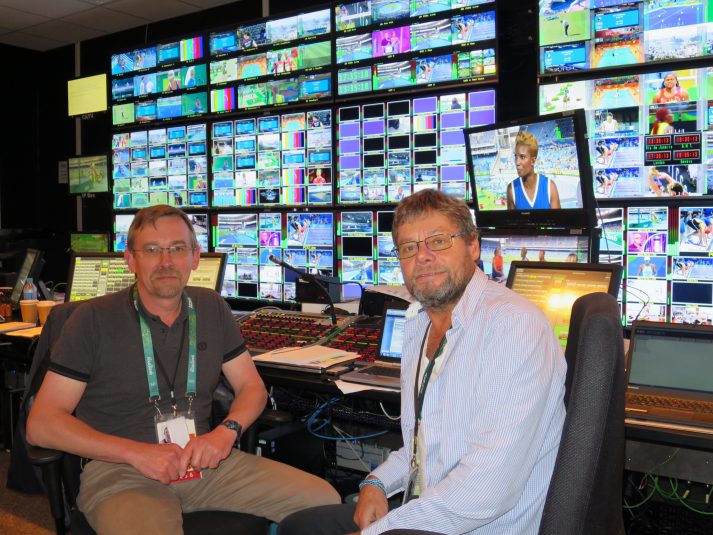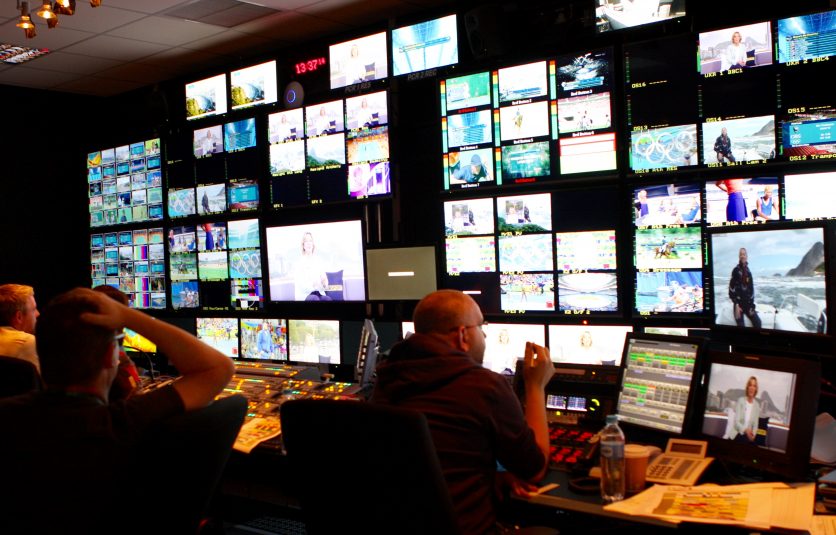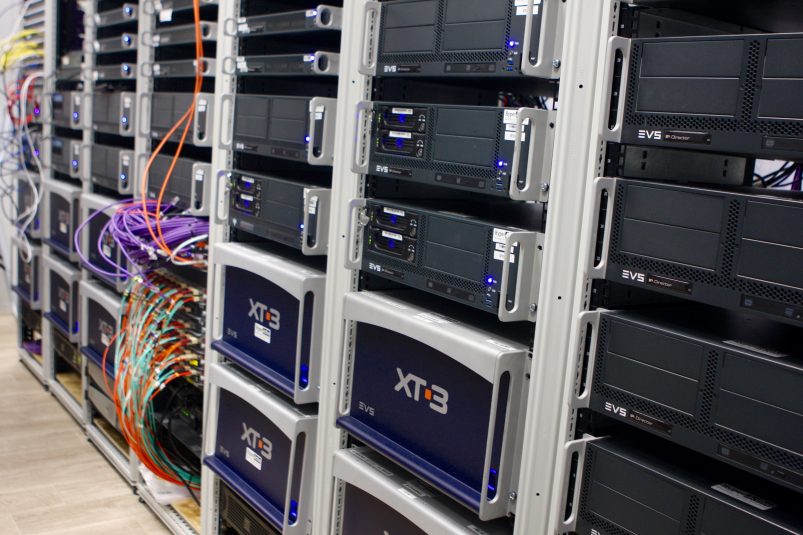Live From Rio 2016: BBC Sport Streamlines From London, but Expectations Are High
The BBC production team at the Rio Olympics is 455 people strong, and, like the Great Britain Olympic team itself, it is trying to make sure it does everything it can to replicate the success of 2012.
“Our team is performing fantastically well and doing it under pressure,” says Jonny Bramley, executive producer, Rio 2016, BBC Sport, noting, “There are external factors that are making things a little bit more difficult.”

Richard Morgan (left) and Jonny Bramley of BBC Sport inside the BBC’s Rio Olympics broadcast-operations center
The BBC’s coverage of the Games can be found in the UK on BBC1 and BBC4 from 9 a.m. to midnight Rio time, which means the core of coverage back home is between 1 p.m. and 4 a.m. A cut-down of the content that airs live from midnight to 4 a.m. is rebroadcast from 9 a.m. to 1 p.m. In addition, there are six Red Button digital channels, and coverage of all sports is available on the web and also on Smart TVs, with all production efforts for those outlets originating at the BBC facility in Salford, UK.
One interesting aspect of this year’s coverage is that, although this might have been an ideal time to base a lot of the production team and studio operations in the UK, the start of the English Premier League season on Aug. 13 made it more economical to operate out of Rio.
“Back home,” explains Richard Morgan, chief engineer, football, BBC Sport, “football started, and our business-as-usual capacity in Salford is scaled around domestic football operations. So it was more economical, bizarrely, to do it onsite here rather than build it out in the UK.”
BBC’s physical presence at the IBC is smaller than it was in 2012: 1,750 sq. meters vs. 2,500 sq. meters. “We have two big control rooms with an audio gallery, one each for the two principal networks,” says Morgan.

One of the two BBC Sport control rooms at the Rio IBC
Between those two control rooms is a broadcast-operations center, which is designed to streamline the incoming content so that staffers in the two control rooms can simply focus on the show. The BBC facilities at the IBC were integrated by Dega Broadcast, which the BBC has used for several other events, including the London Olympics.
“They do a super job, and the installation looks like it is a permanent facility,” says Morgan. “So we get the best of both worlds: it is cut cable but also a really good installation.”
Key equipment includes Sony production switchers, Sony cameras, Calrec audio consoles, an Imagine routing switcher, and For-A frame-rate converters.
“Converting the frame rate is one challenge coming out of here,” says Morgan, “and the For-A gear is proving to be very comparable with other frame-rate converters.”
There are 34 channels of EVS XT3 servers, which do temporary and quick- turnaround storage, and a nearline storage system from Object Matrix provides a storage platform that times into the Avid ISIS storage systems and 12 Avid editing suites (six of which are enclosed for high-level craft editing).

The BBC is making use of 34 channels of EVS XT3 servers.
One unusual aspect of the BBC Olympic operations is that there are 14 logging stations at the Salford facility where BBC staffers input the BBC’s own metadata instead of relying on OBS metadata.
“We prefer our own logging. It is more suited to our needs,” Morgan explains, adding, “Apart from anything else, our archive and business-as-usual workflow has a certain approach, and we don’t want to deviate from that for one event. For quite a lot of our backend systems, it’s easier to stick with one workflow and have a consistent archive.”
Those extra efforts ensure that Olympics content is archived in the same way as all other BBC Sports content so that it can be easily retrieved for years to come. The first step in that process is sending 36 HD services plus numerous other connections to the UK, where the logging takes place. That metadata is available to the production team in Rio.
Streamlined Venue Operations
If there is one place that fans at home will notice a difference versus 2012, it’s that the in-venue presentation has become a bit leaner, with fewer cameras and operators and more reliance on the OBS-provided commentary for some of the content being streamed.
“We’re trying to match the look we had in London but with fewer facilities,” says Bramley.
Morgan cites the production efforts around sailing coverage as an example of how the BBC is trimming around the margins: “In 2012, we had a big outside operation for sailing, but now we just have simple RF cameras that can be cut into the live coverage. And we have far less commentary positions.”
The BBC team is also relying more heavily on the work done by OBS, including using more OBS-provided commentary. The BBC talks with OBS about what it needs out of the commentary (and also offers suggestions on talent), but there have been some compromises.
“Some of the minor sports aren’t commented on throughout,” Bramley notes.
Adds Morgan, “Ultimately, we’re responsible for our output, so, if our output is not as good as it could be, we absolutely carry the can for it. But the production standards on OBS are very good.”
Main studio operations are located at Copacabana Beach, with four studio-camera signals sent to the IBC, where they are switched in a control room. In addition, there are augmented graphics provided by Deltatre with the data sent from the studio, and graphics processing is taking place at the IBC. Lawo equipment is helping in those efforts as well as at the venues.
“For the first time,” says Morgan, “we have a lot more IP from the venues, and we have quite a few venues back via that route.”
The BBC has three radio cameras at the beach hub and four radio cameras at the Olympic Park, all shared by BBC Sport and BBC News.
“We like to do our presentation in venues or in amongst the people to really give people a taste of the Games rather than sterile studios,” says Bramley. “So we’re mixing and matching between a nice studio and being out and about.”
The Games are moving into their second week, and it was at this point in the London Games when the Great Britain team truly became great on the field of competition, particularly at the cycling and track and field events. The BBC is ready, once again, to capture that magic. Now it’s just a matter of Team Great Britain’s stepping up once again.
“Things here are working the way we intended them to in spite of everything that has been thrown at us,” says Bramley. “There isn’t much I would change, in hindsight.”

